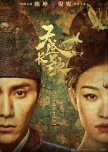
The Rise of Phoenixes
11 persone hanno trovato utile questa recensione
Questa recensione può contenere spoiler
The Rise of Phoenixes lingers in my head: beautiful cinematography, remarkable art and design, and excellent performance and acting. There are lots of implicit story details hidden in Chinese dialogue, actors'/actresses' lines, their subtle performance, and sets/props, which could be easily overlooked. If one tries to find something entertaining, simple, and straightforward, this is not a good fit for that purpose. However, with an imagined historical setting, this drama challenges many Chinese traditions and Confucianist norms. First, The Rise of Phoenixes presents a new level of gender equality in the protagonists' relationship. Although they had romantic feelings towards each other in an ancient setting in which women were subordinates to men, the male protagonist always respected the female protagonist's decisions and intelligence, and she always considered herself an equal to him -- she never asked for help, protection, or acted as an appendage in the court politics. Second, the male protagonist has an interesting modern (also liberal) personality: a challenger and an idealist. His utopia was ALL ARE EQUAL BEFORE THE LAW. This ideal was shared by the female protagonist (hence the strong bond between the two). It is also an interesting reflection of social reality in China and can be discussed in depth in terms of Chinese view about social justice without the system of democracy. In terms of his personality, he is not afraid of confrontation. He is also aggressive and true to his feeling and emotion. He does not compromise. These are not considered to be positive qualities in Chinese and Confucianist culture, and many Chinese stories and TV drama portray that in order to succeed, especially in politics, one must endure pains, hide emotions, and avoid confrontations. Finally, this series presents the emperor/father as a real human being, rather than just a symbol of power. The emperor/father was a man who always chose power over his family, but he was also hurt, had weakness, and felt the pain when he was a father. Unlike other Chinese historical drama, in which the emperor often functions as a symbol of power and is always cruel, I really enjoy the actor's performance, complicating his role between the emperor and father. Highly recommended! This work is worth of going back again and again. Questa recensione ti è stata utile?


